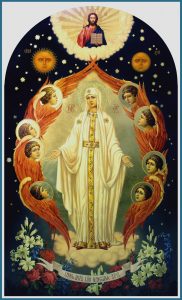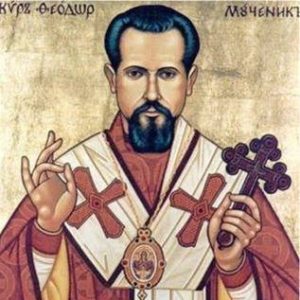 In the Byzantine Catholic Church keeps the feast of Blessed Theodore Romzha is celebrated today. He was a martyred bishop of Mukachevo in Transcarpathia who was killed by the Soviets in hatred for the faith.
In the Byzantine Catholic Church keeps the feast of Blessed Theodore Romzha is celebrated today. He was a martyred bishop of Mukachevo in Transcarpathia who was killed by the Soviets in hatred for the faith.
Under the Protection of the Mother of God
24th Sunday after Pentecost
2016 Eastern Catholic Bible Conference
23rd Sunday after Pentecost
Prayer Before An Election
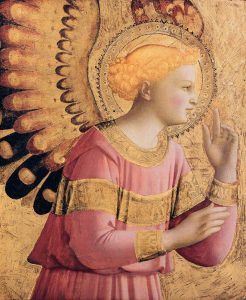 Lord God, as the election approaches, we seek to better understand the issues and concerns that confront our city/state/country, and how the Gospel compels us to respond.
Lord God, as the election approaches, we seek to better understand the issues and concerns that confront our city/state/country, and how the Gospel compels us to respond.
Lord God, as the election approaches, we seek to better understand the issues and concerns that confront our city, state, country, and how the Gospel compels us to respond.
We ask for eyes that are free from blindness so that we might see each other as brothers and sisters, one and equal in dignity, especially those who are victims of abuse and violence, deceit and poverty.
We ask for ears that will hear the cries of children unborn and those abandoned, men and women oppressed because of race or creed, religion or gender.
We ask for minds and hearts that are open to hearing the voice of leaders who will bring us closer to your Kingdom.
We pray for discernment so that we may choose leaders who hear your Word, live your love, and keep in the ways of your truth as they follow in the steps of Jesus and his Apostles and guide us to your Kingdom of justice and peace.
We ask this in the name of your Son Jesus Christ and through the power of the Holy Spirit. Amen.
7th Ecumenical Council
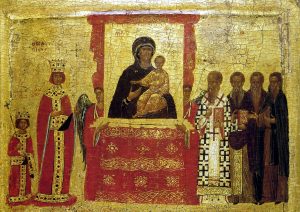 Meditation by Very Rev. Dr. David Petras
Meditation by Very Rev. Dr. David Petras
On this Sunday, we also remember the Nicea II Council in 787, which defined that we can make images (icons) of our Lord and the saints, and venerate them. This council was held in the midst of the iconoclastic (the “image breaking”) controversy, the first phase from 726-787, and the second phase from 814-842. It draws attention to how important images are for us. I know of few homes that do not have a picture, today usually a photograph but sometimes a portrait or drawing, of those we love. If we love Christ first with our whole heart and mind and soul, the image helps us to focus that love. We know these images are only paper or wood and ink or paint, but through the eyes of our body they make the person present in spirit. Yet some people hate images. There is a danger of idolatry, and the council did dialogue with those people who had that fear of idol-worship, and so defined clearly how images are to be venerated: “For the more they are contemplated, the more they move to fervent memory of their prototypes. Therefore, it is proper to accord to them a fervent and reverent adoration, not, however, the veritable worship which, according to our faith, belongs to the Divine Being alone — for the honor accorded to the image passes over to its prototype, and whoever adores the image adores in it the reality of what is there represented.” This is the Christian faith. We cannot make images of the divine nature, but the mystery of the incarnation, in which the Word of God became truly a human being, the two natures united in one person, allows us to make images of Jesus, who was like us in every way except sin. This leads us to a deeper mystery, that we are created in the image of God, and that “all of us, gazing with unveiled face on the glory of the Lord, are being transformed from glory to glory, as from the Lord who is the Spirit. (2 Corinthians 3:18)” And the glory and the wisdom of the Lord is his emptying, his love, his cross and his resurrection.
22nd Sunday after Pentecost
 Meditation by the Very Rev. Dr. David M. Petras
Meditation by the Very Rev. Dr. David M. Petras
Galatians 6:11-18
Luke 8:5-15
Today our Lord explains by way of a parable how we are to accept the word of God in our hearts. The seed is the word of God, and three types of people fail to receive the word: those on the path, eaten by the birds; those on rocky soil; and those among thorns. The story seems complicated, but it is actually quite simple: the people who fail to hear the gospel are those who cannot put Christ first. They put the devil, the evil one, first, and he takes the good news from their hearts; they put themselves first, and fall away at the first hint of personal hardship; they put their possessions and status first, and leave no room for Christ. It is of this third group that we sing in every Liturgy, “Let us who mystically represent the Cherubim and sing the thrice-holy hymn to the life-creating Trinity, now set aside all earthly cares (quoting here Luke 8:14), that we may receive (in Communion) the King of all.” We can hear the good news and let it take root in us if we put Christ first in our lives, “with a generous and good heart (Luke 8:15).” This commitment must be absolute and uncompromising. Therefore, St. Paul gives us the example, “But may I never boast except in the cross of our Lord Jesus Christ, through which the world has been crucified to me and I to the world – a new creation. (Galatians 6:14-15)”
Mary teaches us to surrender to God
Pierogi Saturday is November 12
Make plans for some delicious pierogies in November: call to place your order soon!
 Meditation by the Very Rev. Dr. David M. Petras
Meditation by the Very Rev. Dr. David M. Petras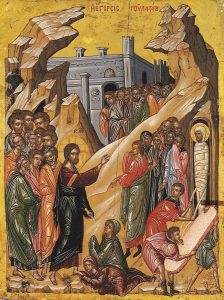 Meditation by the Very Rev. Dr. David M. Petras
Meditation by the Very Rev. Dr. David M. Petras